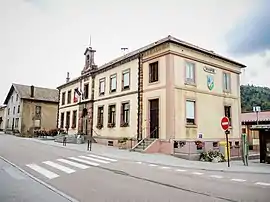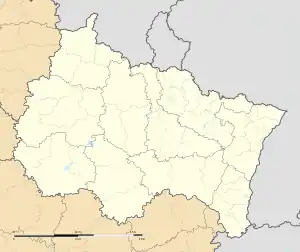Le Ménil
Le Ménil (French pronunciation: [lə menil] ⓘ) is a commune in the Vosges department in Grand Est in northeastern France. It is sometimes called Le Ménil-Thillot to distinguish it from nearby Ménil-de-Senones.
Le Ménil | |
|---|---|
 The town hall in Le Ménil | |
.svg.png.webp) Coat of arms | |
Location of Le Ménil | |
 Le Ménil  Le Ménil | |
| Coordinates: 47°54′29″N 6°47′01″E | |
| Country | France |
| Region | Grand Est |
| Department | Vosges |
| Arrondissement | Épinal |
| Canton | Le Thillot |
| Intercommunality | CC Ballons des Hautes-Vosges |
| Government | |
| • Mayor (2020–2026) | Jean-François Viry[1] |
| Area 1 | 20.38 km2 (7.87 sq mi) |
| Population | 1,005 |
| • Density | 49/km2 (130/sq mi) |
| Time zone | UTC+01:00 (CET) |
| • Summer (DST) | UTC+02:00 (CEST) |
| INSEE/Postal code | 88302 /88160 |
| Elevation | 509–1,106 m (1,670–3,629 ft) |
| 1 French Land Register data, which excludes lakes, ponds, glaciers > 1 km2 (0.386 sq mi or 247 acres) and river estuaries. | |
Inhabitants are called Guédons.
Geography
The commune is positioned in the southeast of the département, some 6 kilometres (4 mi) to the west of the source of the Moselle at Bussang. The intervening presence of a 952-meter mountain peak means that for motorists the drive to Bussang covers approximately 15 kilometres (9 mi) however. Across the Ménil Pass to the northeast, and approached by smaller roads, is the less well known Moselotte River. The pass connects the seat of the canton, Le Thillot, with Cornimont and a number of smaller mountain villages.
The surrounding mountain summits offer superb views, and tourism has become a defining pillar of the local economy. Registered tourist accommodation exceeds 1,000 beds. The presence of a covered go-kart track in a village with a registered population of barely above 1,000 provides further evidence of the importance of tourism.
History
For a long time Le Ménil was a hamlet controlled by Ramonchamp, but it became a parish in its own right in 1735, and acquired the statute on a commune under the Revolution.
See also
References
- "Répertoire national des élus: les maires" (in French). data.gouv.fr, Plateforme ouverte des données publiques françaises. 13 September 2022.
- "Populations légales 2020". The National Institute of Statistics and Economic Studies. 29 December 2022.